Solar Installers Inniswold
Top Solar Panel Installers in Inniswold
Get up to 3 Solar Energy Company quotes for your project today! Compare profiles, reviews, accreditations, portfolio, etc... and choose the best offer.

Baton Rouge Air
4.36 reviews4000 Sherwood Forest Blvd, Baton Rouge, LA 70809, 70809, USBaton Rouge Air is a full-service HVAC & Solar company with over 30 years of expert HVAC experience and over a decade of Solar experience. They are committed to providing the highest quality and performance in their industry. Their team of expertly trained HVAC technicians is nothing less than the best of the best. They are ready to help whether a client is in need of service on a HVAC system, Electrical, or Solar, and are available 24 hours a day to meet your needs.
- Services
- Why Us?
- Accreditations
- Our Team
- Testimonials
- Gallery
Get Quote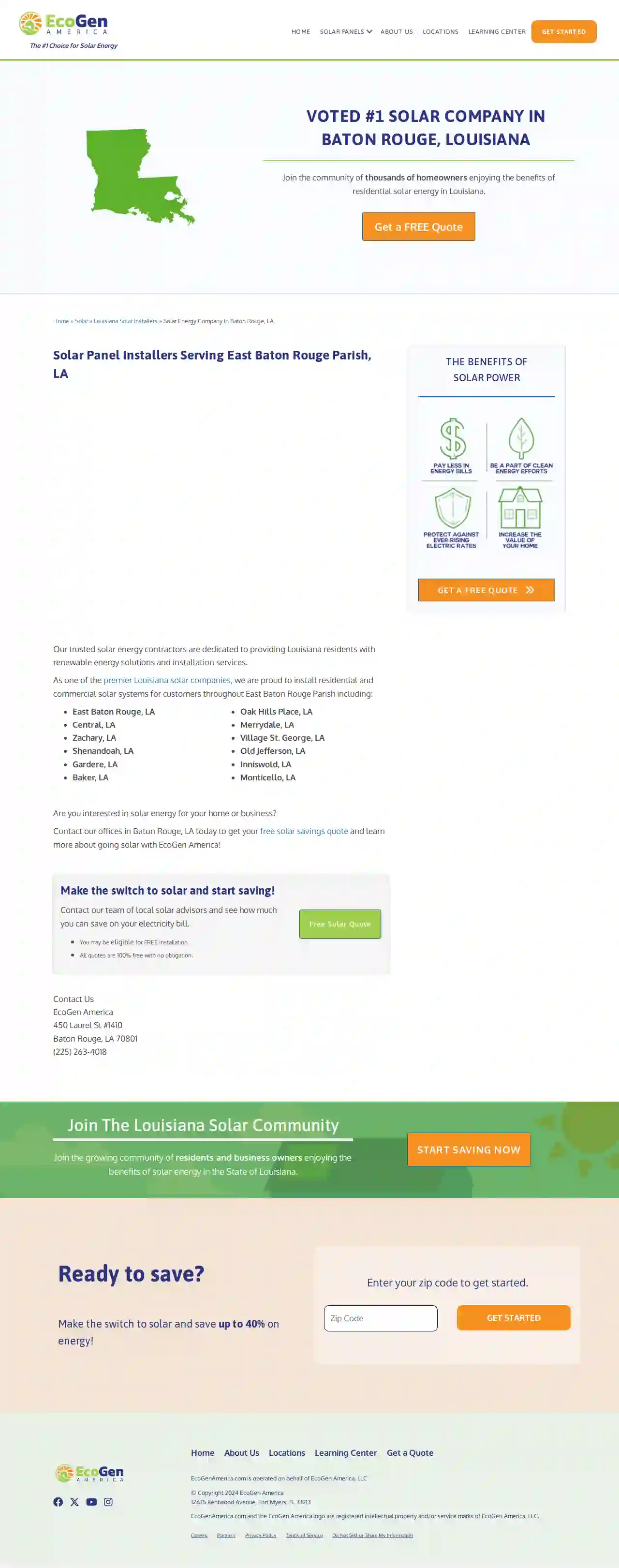
EcoGen America
450 Laurel St #1410, Baton Rouge, 70801, USEcoGen America is a leading solar energy company in Baton Rouge, Louisiana, dedicated to providing renewable energy solutions and installation services. They offer residential and commercial solar systems, with a focus on affordability, industry-leading energy, speedy service, and local support. Their team of local solar advisors helps customers navigate the best solar options for their homes and businesses, ensuring significant savings on energy costs.
- Services
- Why Us?
- Accreditations
- Our Team
- Testimonials
- Gallery
Get Quote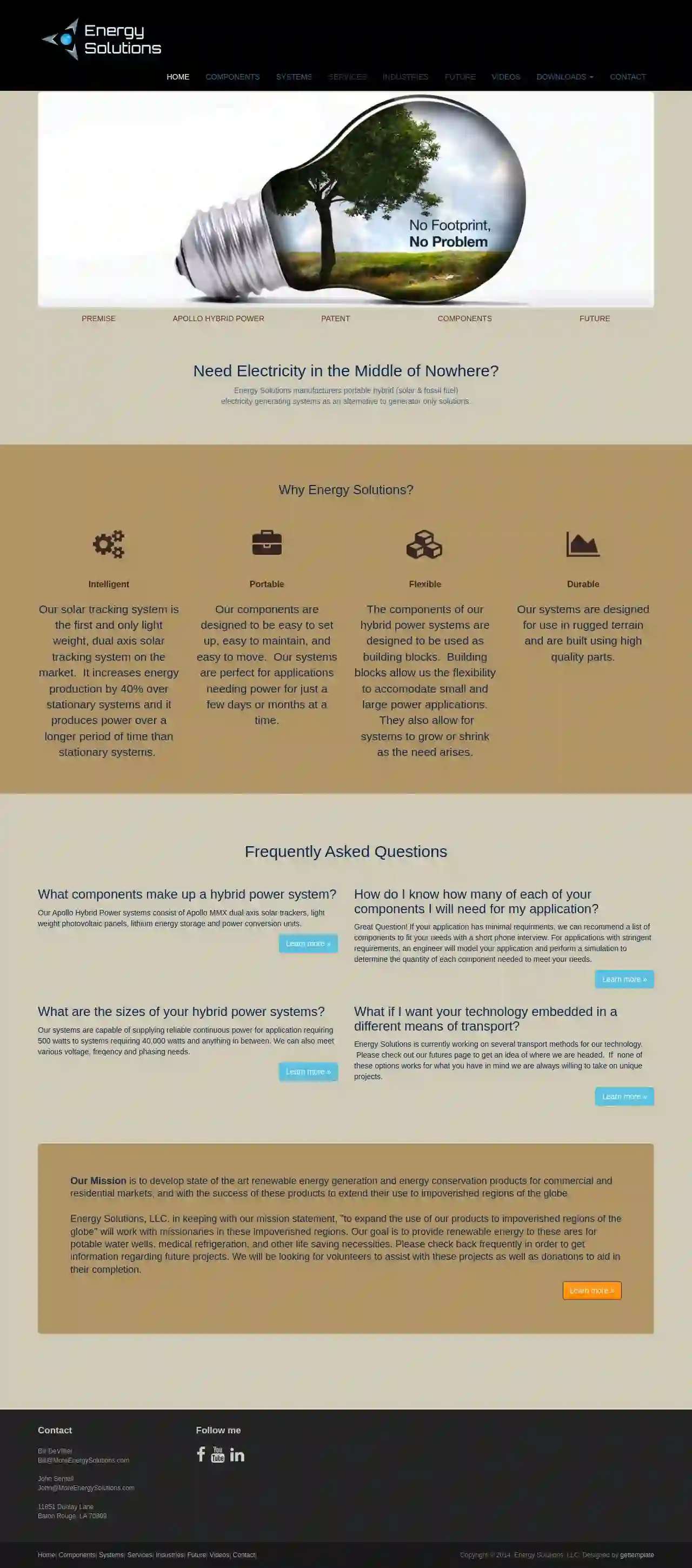
Energy Solutions, LLC
11851 Dunlay Lane, Baton Rouge, LA 70809, 70809, USEnergy Solutions manufacturers portable hybrid (solar & fossil fuel) electricity generating systems as an alternative to generator only solutions. Our mission is to develop state of the art renewable energy generation and energy conservation products for commercial and residential markets; and with the success of these products to extend their use to impoverished regions of the globe.
- Services
- Why Us?
- Accreditations
- Our Team
- Testimonials
- Gallery
Get Quote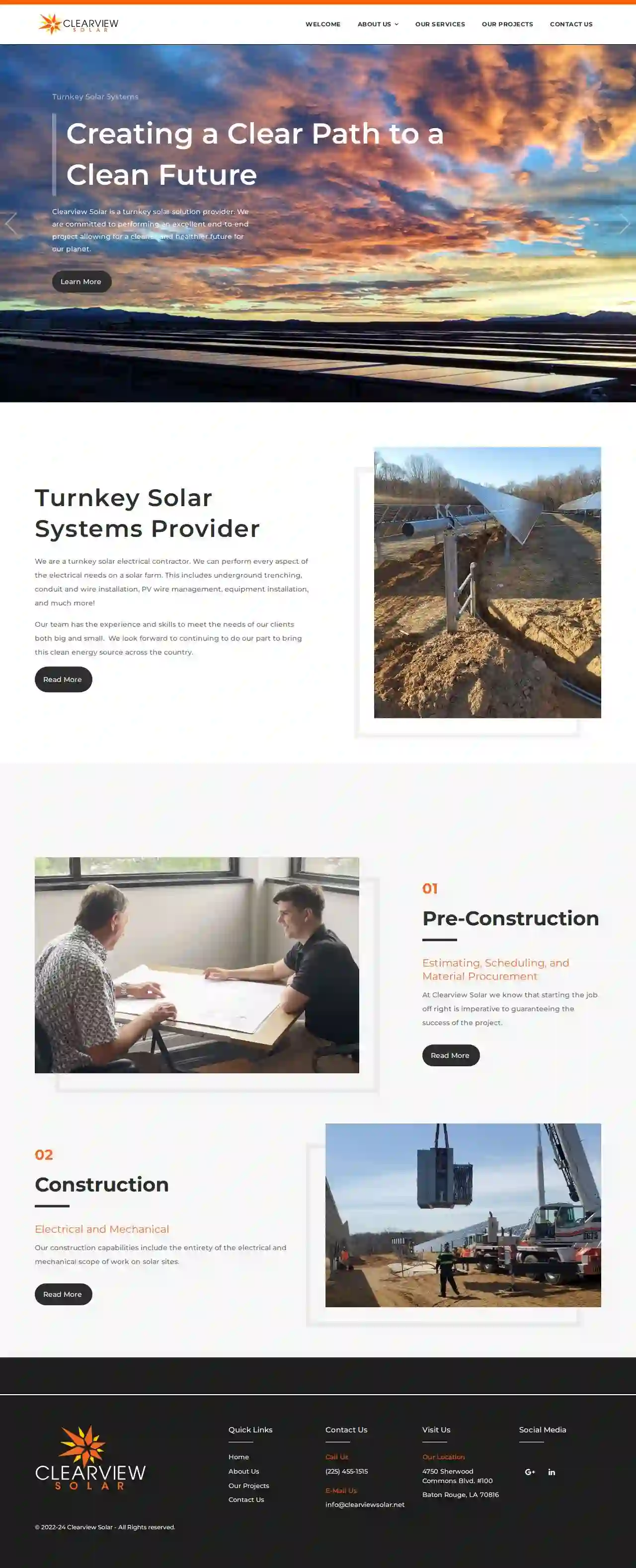
Clearview Solar
4750 Sherwood Commons Blvd. #100, Baton Rouge, 70816, USClearview Solar is a turnkey solar solution provider committed to performing an excellent end-to-end project allowing for a cleaner and healthier future for our planet. We are a turnkey solar electrical contractor with the experience and skills to meet the needs of our clients both big and small. Our mission is to lead our world into a sustainable future by implementing utility-scale solar projects that help reduce our impact on the environment.
- Services
- Why Us?
- Accreditations
- Our Team
- Testimonials
- Gallery
Get Quote
Solar Refrigeration & Appliance Services
4.590 reviewsMetairie, LA, 3211 Metairie Road, 70001, USSolar Refrigeration & Appliance Service, Inc. is a top-rated appliance repair company in Southeast Louisiana & Jackson, MS. We come highly recommended on Facebook, Google, BirdEye, and Yelp. We also hold the highest-rated A+ BBB Accreditation, membership status with the United Appliance Servicers Association, and the New Orleans Chamber of Commerce. If you need the best appliance repair Metairie or the surrounding areas have to offer, choose the highly rated experts at Solar!
- Services
- Why Us?
- Accreditations
- Our Team
- Testimonials
- Gallery
Get Quote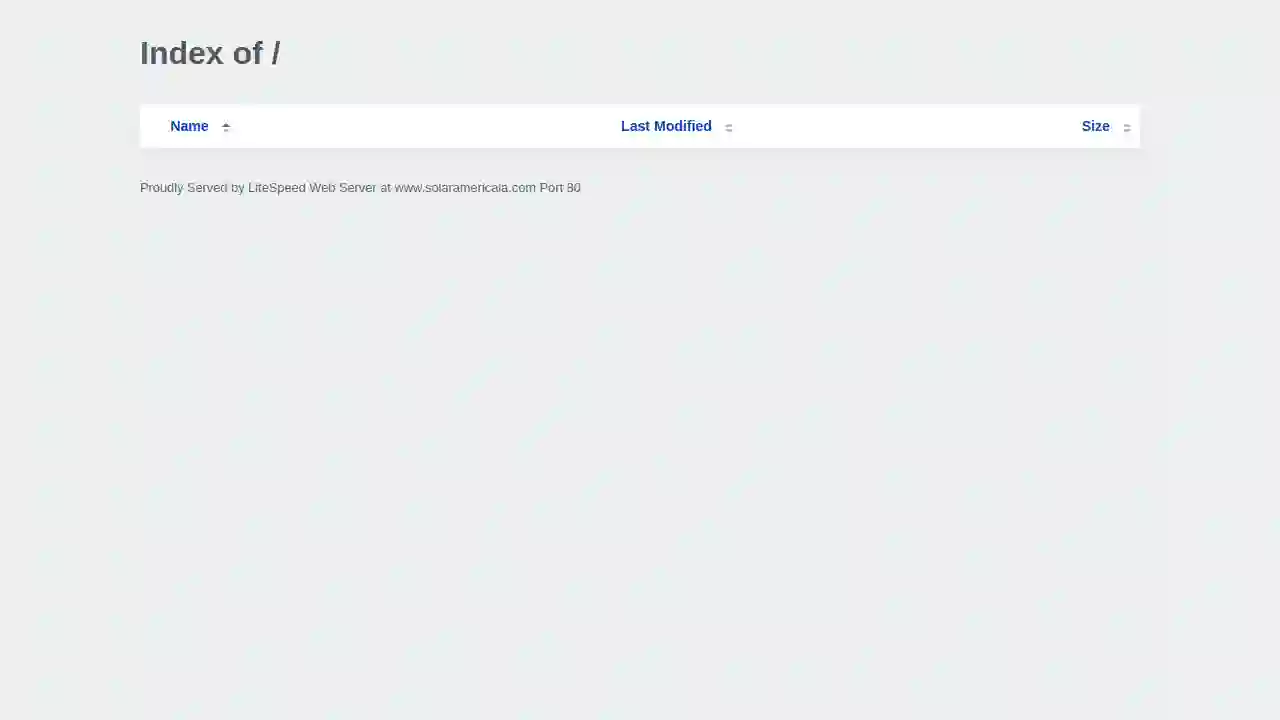
Solar America - Louisiana
3.73 reviews123 Solar Way, Suite 100, Los Angeles, 90001, USSolarAmerica is a leading provider of solar energy solutions, dedicated to helping homeowners and businesses reduce their energy costs and carbon footprint. With over 15 years of experience in the industry, we offer a wide range of services including solar panel installation, maintenance, and repair. Our team of certified professionals is committed to delivering exceptional service and ensuring customer satisfaction.
- Services
- Why Us?
- Accreditations
- Our Team
- Testimonials
Get Quote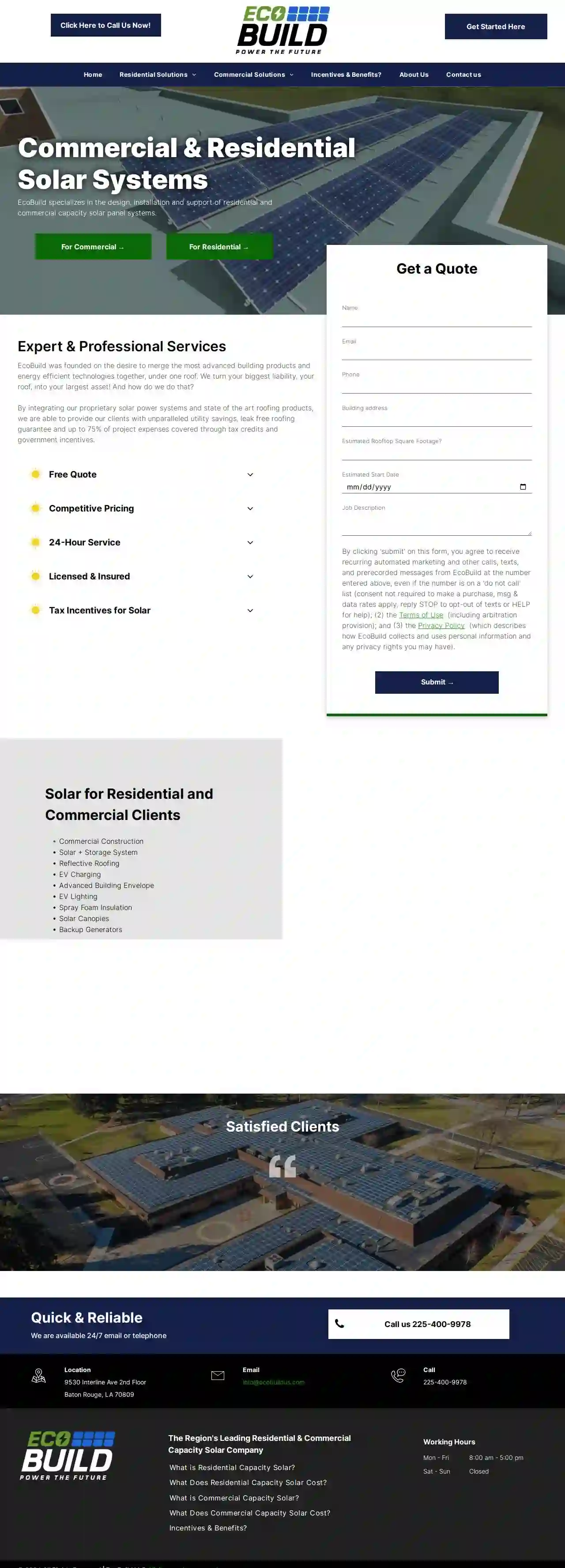
EcoBuild LLC
527 reviews2nd Floor, 9530 Interline Ave, Baton Rouge, 70809, USEcoBuild specializes in the design, installation, and support of residential and commercial capacity solar panel systems. Founded on the desire to merge advanced building products and energy-efficient technologies, EcoBuild turns your biggest liability into your largest asset by integrating proprietary solar power systems and state-of-the-art roofing products. This provides clients with unparalleled utility savings, leak-free roofing guarantee, and up to 75% of project expenses covered through tax credits and government incentives.
- Services
- Why Us?
- Accreditations
- Our Team
- Testimonials
- Gallery
Get Quote
Solar Genie - Baton Rouge Solar Energy Company
Beverly Hills, CA, 123 Solar Lane, 90210, USSolar Genie is a leading provider of rooftop solar systems and more. With years of experience in the industry, we have developed an unbeatable system that will help you maximize your return on investment for your home or business. Our team is comprised of experienced professionals who are dedicated to providing high-quality installations and customer service. We provide comprehensive solutions that include everything from design and engineering to permitting and inspection processes. Plus, all of our materials come backed with warranties for added peace of mind.
- Services
- Why Us?
- Accreditations
- Our Team
- Testimonials
- Gallery
Get Quote
JCO SOLAR
59 reviewsN/A, Denham Springs, 70726, USJCO SOLAR is a family-owned business based in Denham Springs, LA, specializing in residential and commercial solar solutions. They offer customized solar energy systems, ground mount installations, energy storage solutions, and more. Their team of fully insured and licensed professionals aim to deliver high-quality work and customer satisfaction.
- Services
- Why Us?
- Accreditations
- Our Team
- Testimonials
- Gallery
Get Quote
PosiGen
4.298 reviews123 Solar Way, Beverly Hills, 90210, USPosiGen is dedicated to helping our customers reduce their energy costs (and their carbon footprints) through our energy-saving solutions. Explore our services to find the right fit for you and your home.
- Services
- Why Us?
- Accreditations
- Our Team
- Testimonials
- Gallery
Get Quote
Over 4,210+ Solar Installers onboarded
Our solar companies operate in Inniswold and surroundings!
SolarCompaniesHub has curated and vetted Top Solar Contractors near Inniswold. Find a top & reliable contractor today.
Frequently Asked Questions About Solar Installers
- Contact SolarCompaniesHub: We make it simple to connect with reputable Solar Installers in your area.
- Get Free Quotes: Request free quotes from multiple installers to compare prices, systems, and warranties.
- Schedule a Site Assessment: A qualified installer will visit your property to assess your roof, energy needs, and discuss your goals.
- Review Your Proposal and Contract: Carefully review the proposed system, financing options, and warranties before signing a contract.
- Installation and Activation: Once the contract is signed, the installer will obtain necessary permits, schedule the installation, and activate your solar system.
- Tax Credits: Reduce your income tax liability based on the cost of your solar system.
- Rebates: Direct cash payments or discounts on the purchase of a solar energy system.
- Net Metering: Allows you to sell excess solar electricity back to the grid for credits.
- Renewable Energy Certificates (RECs): Tradeable credits representing the environmental attributes of your solar energy generation.
How do I get started with solar panel installation?
Do I need to replace my roof before installing solar panels?
Will solar panels work during cloudy days or at night?
Are there any financial incentives for going solar?
How do I get started with solar panel installation?
- Contact SolarCompaniesHub: We make it simple to connect with reputable Solar Installers in your area.
- Get Free Quotes: Request free quotes from multiple installers to compare prices, systems, and warranties.
- Schedule a Site Assessment: A qualified installer will visit your property to assess your roof, energy needs, and discuss your goals.
- Review Your Proposal and Contract: Carefully review the proposed system, financing options, and warranties before signing a contract.
- Installation and Activation: Once the contract is signed, the installer will obtain necessary permits, schedule the installation, and activate your solar system.
Do I need to replace my roof before installing solar panels?
Will solar panels work during cloudy days or at night?
Are there any financial incentives for going solar?
- Tax Credits: Reduce your income tax liability based on the cost of your solar system.
- Rebates: Direct cash payments or discounts on the purchase of a solar energy system.
- Net Metering: Allows you to sell excess solar electricity back to the grid for credits.
- Renewable Energy Certificates (RECs): Tradeable credits representing the environmental attributes of your solar energy generation.